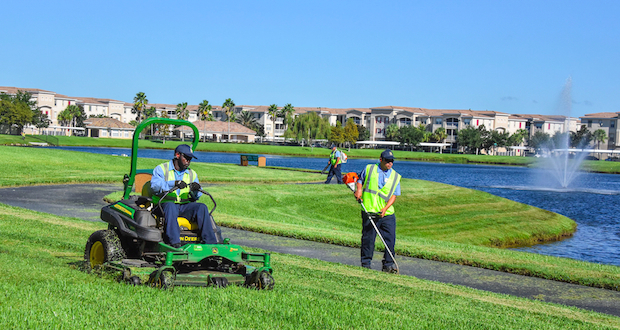Common Offseason Staffing Challenges
By Mike Fitzpatrick

Regardless of which region you are in, you can still experience the changing seasons to varying degrees. In the Northeast, for example, the offseason starts in early November and ends in early April. Despite their warmer climates, even Florida and Texas have all four seasons.
The offseason is typically defined as the period between your first and last typical frost dates. Soil temperatures dictate what plants need, not the dates on a calendar. This makes it that much more important to offer alternative services that aren’t reliant on the temperature of the soil. There are several challenges that the offseason presents to companies in the landscaping industry; the biggest of which is that while grounds care maintenance providers typically earn their lowest revenue during this time, they don’t want to lay off their employees. So, the challenge becomes how do you pay your overhead expenses while your revenue is down, while keeping your employees gainfully employed. While this can be challenging, it is possible, and many of our franchisees have been doing this successfully for years. The answer is two-fold: careful planning, and offering alternative services if your region allows for it.
Plan for your offseason
Careful planning involves knowing your region, understanding your property’s needs, and planning early. We start planning for the offseason at the beginning of the year to determine cash needs for the offseason, and to plan with customers to execute projects during our slow time. Grounds care providers should keep their budget in mind for their fixed overhead costs, so that they can continue to pay their bills on time to keep their business operating. They want to keep their management team in place, as well as their top crewmembers. To do this, they must know how much revenue they need to generate during the slow season to keep those people in place.
But how do you plan in regions that are known for their unpredictable weather? In Indianapolis and St. Louis, for example, it isn’t easy trying to predict whether they will get much snow each year — making it difficult for snow service providers in those areas to plan accordingly. If you offer snow services, you know how challenging this is and the need to know how many employees you must take care of. But by planning ahead and getting snow service contracts up front, you can better position your company through this season. Another option can involve equipment finance companies. If you are currently financing any of your company’s equipment, some finance companies might allow you to pay only nine months of the year, and they let you pick the three months you don’t have to pay. So, you could time your non-payment months with your company’s offseason.
Expand your services
By expanding your company’s services, you are shortening the window of your reduced revenue. This could mean that you sell landscape improvement services at the beginning and end of the offseason. You will be fine as long as you don’t perform those types of services when the ground freezes. This is one of the reasons we recommend that landscape maintenance companies expand their services. Other ways grounds care maintenance companies can expand their services include installing and taking down Christmas decorations, installing pavers, offering to do some type of hardscaping (in the South), or providing snow services if you are in the Northeast. The further north you go, there is a cash flow component that other areas can’t necessarily benefit from.
Protect your employees
Part of expanding your services relies on your employees. If you are in a position where you have to let some of your employees go, it means that you need to rely even more on the employees you have kept on staff. But it can be a challenge to keep even your key employees gainfully employed, especially when they hear that your company has laid off other employees already. One way to combat this is to offer reduced workweeks. This is when everyone on the crew works 30 hours/week. Some employers then work directly with their State Unemployment Board, to form an agreement so that their company pays the employees for 30 hours per week and the state pays those employees the remaining 10 hours per week. This way the employees are taken care of, and the state pays less than what it would have to pay if those employees were unemployed. You may or may not be able to maintain your team at the same level during the offseason, but the trick is to line up those additional services first.
Communicate with your customers
Grounds care crews often work seamlessly in the background, but some customers notice when they have a new crew in the offseason. They may even ask where their regular crew is, or why it seems that they don’t have as many crewmembers working on their property. While sending out an e-newsletter to your customers is a nice way of keeping them informed, it isn’t necessary to write something formal to make them aware of these changes. This information can easily be communicated in person or over the phone. By communicating with your customers before the offseason, you can let them know about your seasonal plans, what changes to expect, and propose any additional services they may need that you can provide. This proactive approach will help ensure that the lines of communication are open, reduce any surprises for your customers, and it is an inexpensive way to retain your customers’ loyalty.
While the offseason can present many challenges, it is also a great time to plan your upcoming year. Creating your strategy for the upcoming year, budgeting, staffing, advertising, and other tasks that you don’t typically have time to perform during your busier seasons can be done during this time. This isn’t to say that you aren’t busy in the offseason. Training your employees, building your customer relationships and performing inventory management can certainly keep you busy — and that’s not including any snow services you may perform. But many grounds care providers see this as a time to refresh and refocus on their company’s goals.
Mike Fitzpatrick is vice president of U.S. Lawns, a commercial landscape maintenance company. For more information, visit https://uslawns.com.

